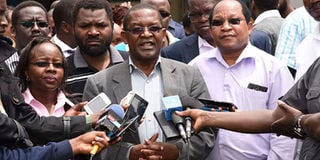The blight Moi University medical students battle

Prof Robert Tenge, a lecturer at Moi University School of Medicine, leads his colleagues in addressing issues concerning their strike, on May 21, 2018 at St Luke’s Orthopaedic and Trauma Hospital in Eldoret. Such strikes are inconveniencing students. PHOTO | FILE | NATION MEDIA GROUP
What you need to know:
- Most students support better employment terms for lecturers and blame university administrators for not accommodating the dons’ demands.
- Prof Lukoye Atwoli quit as the School of Medicine dean, saying the administration had failed to address the frequent strikes.
When they joined Moi University in Eldoret in 2012 to study medicine, they hoped that after six years they would graduate as doctors, ready to serve their country.
But seven years later, their dreams remain unfulfilled.
A Bachelor of Medicine degree takes six years at other Kenyan universities, but at Moi the duration is now unpredictable.
The current group of students in their final year at the School of Medicine have spent an extra year due to a number of strikes during their course.
They should have graduated last year, but the forced breaks pushed their learning to this year.
But even as the year draws to a close, they are not sure they will graduate in December as scheduled.
A strike over unpaid clinical allowances dating back to 2017 called by their lecturers in June, which continued until early September, is once again threatening to thwart their graduation plans.
DEPRESSED
That strike followed another last year that lasted months, before a temporary solution was found. It was also about unpaid allowances.
At least five strikes have been witnessed at the university in the past five years, with two long ones in 2017.
The strikes have become so common that the last one ended after two months, thanks to a court’s intervention.
But the lecturers promised one soon if their grievances were not addressed. Students who spoke to the Nation lamented that the strikes were taking a serious toll on them.
Most of them support better employment terms for lecturers and blame university administrators for not accommodating the dons’ demands.
“Depression is real here,” said a final-year student, who asked not to be named.
“My inner spirit for this course is now diminishing. Back in 2012 when I joined this institution, I was very focused. But honestly, I’m now a bit lost. These frequent strikes by our lecturers have really messed me. This is my seventh year.”
HELB
What is frustrating them is that their colleagues who studied medicine at other universities have completed their studies and are looking for jobs.
Another student said he has been struggling to make ends meet because of the delay in completing his studies.
He added that were it not for the recurrent, prolonged strikes, he would have survived comfortably on the Higher Education Loans Board (Helb) cash he had been relying on since he joined the school.
“My last Helb money came last year. That is what I have been surviving on all along. This is my seventh year. We have tried appealing to the Helb board to give us a little extra money this year, but in vain,” he said.
Students resumed studies only last week after their lecturers suspended their two-and-a-half-month strike.
They now want the administration and the Ministry of Education to look for a lasting solution to the strikes.
ATWOLI QUITS
Prof Benson Gakinya of the Department of Mental Health said he had talked to a number of students who are battling stress because of the prolonged studies.
But he added that the lecturers were also affected. “Probably, the lecturers are the worst-affected by these strikes. It is just that no one appreciates their suffering. Striking now and then so that your grievances are addressed is very stressful,” he said.
Prof Lukoye Atwoli, the long-serving dean of the School of Medicine, quit the position during the strike, saying the administration had failed to address the frequent strikes.
The school’s principal, Prof Robert Tenge, said they were working on a plan to end the perennial strikes. He said talks are necessary between the university, the ministries of Education and Health, the Salaries and Remuneration Commission and the Treasury to ensure that the lecturers’ grievances are addressed as soon as possible.





